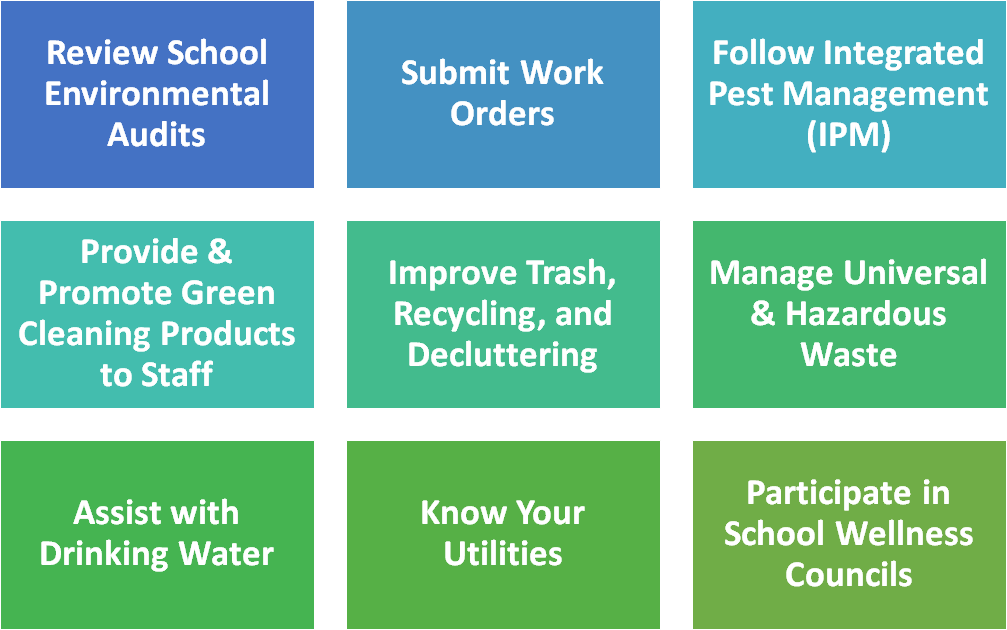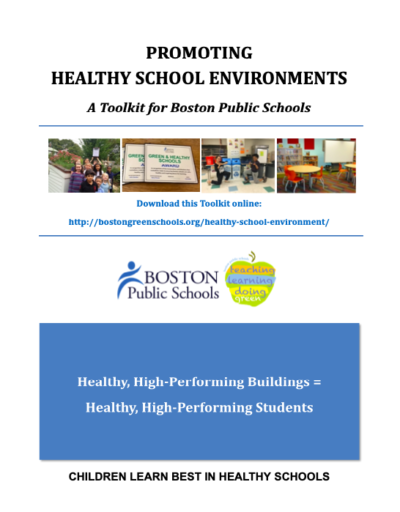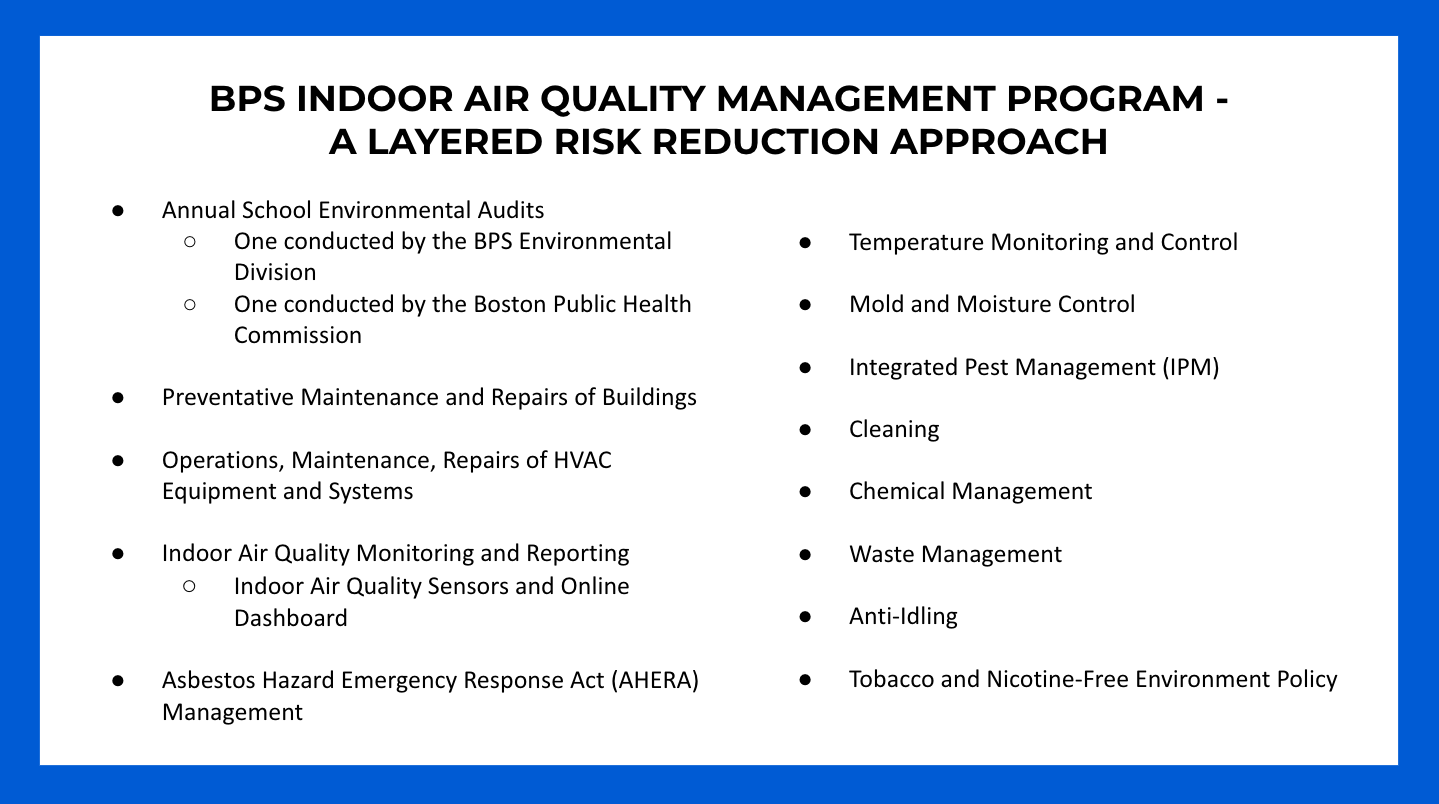BPS is committed to providing high-performing school buildings and grounds that are clean, in good repair, have healthy indoor air quality and water quality, have sanitary and accessible bathrooms, and use resources efficiently.
Incorporate Healthy School Environment into your School Wellness Council Action Plan, based on the Healthy School Environment Section of the District Wellness Policy. Topics include:
– Green Cleaners
– Integrated Pest Management (IPM)
– Trash and Recycling
– Infection Prevention & Control
– Tobacco Free Environmental Policy
– School Environmental Inspections/Audits
– Student Safety/Health in School Shops
– BPS Water Policy
– Laboratories and Chemical Inventory “Right to Know” Law
– Idling of buses and other motor vehicles on school property
WAYS TO IMPROVE YOUR SCHOOL ENVIRONMENT


CHILDREN LEARN BEST IN HEALTHY SCHOOLS
The Boston Public Schools Healthy School Environments Toolkit was developed to assist BPS School Leaders and their Wellness Councils implement the Healthy School Environment Policy, a component of the District’s Comprehensive Health & Wellness Policy. The Toolkit is a guide for assessing, taking action, communicating, and evaluating environmental, health, and safety issues in our schools. It provides definitions of environmental factors to consider, links to current policies, procedures, and best practices to address specific environmental factors identified in the annual BPS School Environmental Audits.
TAKE ACTION
DISTRICT HIGHLIGHTS:
- The District Wellness, through the Office of Health and Wellness, annually supports Wellness Champions in the eight content sections of the District Wellness Policy. For example, the BPS Sustainability, Energy, and Environment Program trained and supported eleven 2018-2019 BPS Healthy School Environment Champions, who completed schools-based environmental projects, such as recycling, green cleaning, and decluttering, at their schools. That year, Conley Elementary School was awarded the Healthy School Environment Award for creating a school environment where students understood how to reduce, reuse, and recycle and took ownership to implement the three R’s into the culture of the school.
- In SY20-21, Boston Public Schools, led by the BPS Sustainability, Energy, and Environment Program, made the unprecedented decision to invest in Indoor Air Quality (IAQ) sensors in all BPS schools. The sensors were installed in all classrooms, Main Offices, and Nurses’ Offices across the district, with one outdoor sensor installed on every school’s rooftop. The sensors report real-time IAQ data to an online, public dashboard, and the BPS Facilities Management team uses the data to take appropriate action on elevated IAQ levels and request investments in HVAC systems districtwide.
- As a result of this pioneering work, BPS has been invited to present its experience to the White House COVID-19 Taskforce and Office of Science and Technology Policy (OSTP), U.S. Environmental Protection Agency (EPA), National Caucus of Environmental Legislators, Environmental Law Institute, U.S. Green Building Council, and Center for Green Schools, as well as other public health and air quality experts, influencing national and international technical guidance and resources for improving indoor air quality in K-12 schools.
- BPS has since been awarded a $15.4M Improving Ventilation and Air Quality (IVAQ) Grant from the MA Department of Elementary and Secondary Education (DESE), Best in Class – Energy Efficiency Plus Health from the 2023 U.S. Department of Energy’s Efficient and Healthy Schools Campaign, and a 2023 U.S. Department of Education Green Ribbon School District Sustainability Award.
- The BPS Sustainability, Energy, and Environment Program is partnering with Boston University Public Health on an approved research study entitled “Understanding indoor air quality, thermal comfort, and energy use in classrooms, and the impact of SARS-CoV-2 engineering controls, a pilot study.”
- The study is transforming the IAQ sensor data into research data, and includes data analysis and reporting; addressing inaccuracies in data due to calibration, connectivity, and power issues; and developing IAQ communications materials (e.g. facts sheets) for the BPS community.
- The study is transforming the IAQ sensor data into research data, and includes data analysis and reporting; addressing inaccuracies in data due to calibration, connectivity, and power issues; and developing IAQ communications materials (e.g. facts sheets) for the BPS community.
- In collaboration with the BPS Department of Food and Nutrition Service (FNS), the Shah Family Foundation, and the City of Boston Public Facilities Department, BPS Facilities Management renovated 106 school kitchens within a four year period. Of the 106 kitchens, 81 have been rolled out to support on-site meal preparation and cooking. Due to the pandemic, 25 schools remain to be rolled out during the school year 2022-2023. FNS and Facilities Management also partner closely on IPM and water testing all kitchen equipment used for food prep to ensure healthy, safe cooking and eating spaces in BPS schools.
CONTACT US
Facilities Management
1216 Dorchester Ave.
Boston, MA 02125
617-635-9576
